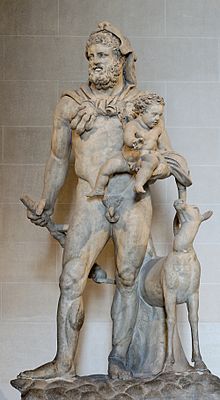Heracleidae

The Heracleidae (
In the historical period, several dynasties claimed descent from Heracles, such as the Agiads and Eurypontids of Sparta, or the Temenids of Macedonia.
Origin
Heracles, whom
After the death of
Dorian invasion
At last,
The oracle, being again consulted by
The Heracleidae, who thus became practically masters of Peloponnesus, proceeded to distribute its territory among themselves by lot.
This conquest of
List of Heracleidae
At Sparta
At
At Corinth
At Corinth the Heraclids ruled as the Bacchiadae dynasty[6] before the aristocratic revolution, which brought a Bacchiad aristocracy into power.
At Argos

A descendant of Heracles, Temenus, was the first king of Argos, who later counted the famous tyrant Pheidon.
At Macedonia
At
In Euripides' tragedy
The Greek tragedians amplified the story, probably drawing inspiration from local legends which glorified the services rendered by Athens to the rulers of Peloponnesus.
The Heracleidae feature as the main subjects of Euripides' play, Heracleidae.[10] J. A. Spranger found the political subtext of Heracleidae, never far to seek, so particularly apt in Athens towards the end of the peace of Nicias, in 419 BCE, that he suggested the date as that of the play's first performance.[11]
In the tragedy, Iolaus, Heracles' old comrade and nephew, and Heracles' children, Macaria and her brothers and sisters have hidden from Eurystheus in Athens, ruled by King Demophon; as the first scene makes clear, they expect that the blood relationship of the kings with Heracles and their father's past indebtedness to Theseus will finally provide them sanctuary. As Eurystheus prepares to attack, an oracle tells Demophon that only the sacrifice of a noble woman to Persephone can guarantee an Athenian victory. Macaria volunteers for the sacrifice and a spring is named the Macarian spring in her honor.
References
- ^ Chisholm 1911, p. 308.
- ^ Chisholm 1911, pp. 308–309.
- ^ a b c d Chisholm 1911, p. 309.
- ^ Thucydides, History of the Peloponnesian War 1.12
- ^ Apollodorus, Library 2.8.4
- ^ Diodorus Siculus, 7.9
- ISBN 978-0-19-866121-4.
In historical times the royal house traced its descent from the mythical Temenus, king of Argos, who was one of the Heracleidae, and more immediately from Perdiccas I, who left Argos for Illyria, probably in the mid-seventh century BC, and from there captured the Macedonian plain and occupied the fortress of Aegae (Vergina), setting himself up as king of the Macedonians.
- ^ "Pausanias, Description of Greece, Boeotia, chapter 40". pp. 8–9. Retrieved 2021-08-21.
- ISBN 978-0-520-95469-4.
- Heracles Mad).
- ^ J. A. Spranger, "The Political Element in the Heracleidae of Euripides" The Classical Quarterly 19.3/4 (July 1925), pp. 117-128.
Sources
- Bibliotheca ii. 8
- Diodorus Siculus iv. 57, 58
- Pausanias i. 32, 41, ii. 13, 18, iii. I, iv. 3, v. 3
- Heracleidae
- Pindar, Pythia, ix. 137
- Herodotus ix. 27
- Connop Thirlwall, History of Greece, ch. vii
- George Grote, History of Greece, pt. i. ch. xviii
- Georg Busolt, Griechische Geschichte, i. ch. ii. sec. 7, where a list of modern authorities is given
External links
This article incorporates text from a publication now in the public domain: Chisholm, Hugh, ed. (1911). "Heraclidae". Encyclopædia Britannica. Vol. 13 (11th ed.). Cambridge University Press. pp. 308–309.
